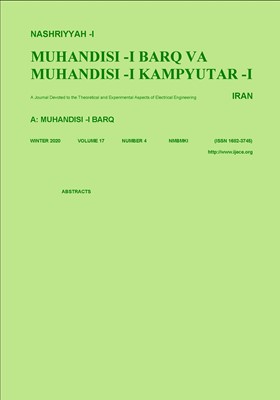An Intelligent Approach for OFDM Channel Estimation Using Gravitational Search Algorithm
Subject Areas : electrical and computer engineeringF. Salehi 1 , mohammad hassan majidi 2 * , N. Neda 3
1 -
2 -
3 -
Abstract :
The abundant benefits of Orthogonal Frequency-Division Multiplexing (OFDM) and its high flexibility have resulted in its widespread applications in many telecommunication standards. One important parameter for improving wireless system’s efficiency is the accurate estimation of channel state information (CSI). In the literatures many techniques have been studied in order to estimate the CSI. Nowadays, the techniques based on intelligent algorithms such as genetic algorithm (GA) and particle swarm optimization (PSO) have attracted attention of researchers. With a very low pilot overhead, these techniques are able to estimate the channel frequency response (CFR) properly only using the received signals. Unfortunately each of these techniques suffers a common weakness: they have a slow convergence rate. In this paper, a new intelligent and different method has been presented for channel estimation using gravitational search algorithm (GSA). This method can achieve accurate channel estimation with a moderate computational complexity in comparison with GA and PSO estimators. Furthermore, with higher convergence rate our proposed method is capable of providing the same performance as GA and PSO. For a two-path fast fading channel, simulation results demonstrate the robustness of our proposed scheme according to the bit error rate (BER) and the mean square error (MSE).
[1] T. Hwang, C. Yang, G. Wu, S. Li, and G. Ye Li, "OFDM and its wireless applications: a survey," IEEE Trans. on Vehicular Technology, vol. 58, no. 4, pp. 1673-1694, May 2009.
[2] B. Farhang-Boroujeny and H. Moradi, "OFDM inspired waveforms for 5G," IEEE Communications Surveys & Tutorials, vol. 18, no. 4, pp. 2474-2492, First Quarter 2016.
[3] W. Zhang, F. Gao, and Q. Yin, "Blind channel estimation for MIMO-OFDM systems with low order signal constellation," IEEE Communications Letters, vol. 19, no. 3, pp. 499-502, Mar. 2015.
[4] T. Lv, S. Yang, and H. Gao, "Semi-blind channel estimation relying on optimum pilots designed for multi-cell large-scale MIMO systems," IEEE Access, vol. 4, pp. 1190-1204, Mar. 2016.
[5] C. H. Tseng, Y. C. Cheng, and C. D. Chung, "Subspace-based blind channel estimation for OFDM by exploiting cyclic prefix," IEEE Wireless Communications Letters, vol. 2, no. 6, pp. 691-694, Dec. 2013.
[6] E. Nayebi and B. D. Rao, "Semi-blind channel estimation for multiuser massive MIMO systems," IEEE Trans. on Signal Processing, vol. 66, no. 2, pp. 540-553, Jan. 2018.
[7] H. Ye, G. Ye Li, and B. H. Juang, "Power of deep learning for channel estimation and signal detection in OFDM systems," IEEE Wireless Communications Letters, vol. 7, no. 1, pp. 114-117, Feb. 2018.
[8] D. Kong, D. Qu, K. Luo, and T. Jiang, "Channel estimation under staggered frame structure for massive MIMO system," IEEE Trans. on Wireless Communications, vol. 15, no. 2, pp. 1469-1479, Feb. 2016.
[9] W. Peng, M. Zou, and T. Jiang, "Channel prediction in time-varying massive MIMO environments," IEEE Access, vol. 5, pp. 23938-23946, Nov. 2017.
[10] Z. Sheng, H. Duong Tuan, H. H. Nguyen, and Y. Fang, "Pilot optimization for estimation of high-mobility OFDM channels," IEEE Trans. on Vehicular Technology, vol. 66, no. 10, pp. 8795-8806, Oct. 2017.
[11] J. Ma, S. Zhang, H. Li, N. Zhao, and A. Nallanathan, "Iterative LMMSE individual channel estimation over relay networks with multiple antennas," IEEE Trans. on Vehicular Technology, vol. 67, no. 1, pp. 423-435, Jan. 2018.
[12] M. Morelli and M. Moretti, "Channel estimation in OFDM systems with unknown interference," IEEE Trans. on Wireless Communications, vol. 8, no. 10, pp. 5338-5347, Oct. 2009.
[13] F. Salehi and N. Neda, "Channel estimation for MIMO-OFDM systems based on multiplexed pilot and superimposed pilot," in Proc. IEEE Int. Congress on Technology, Communication and Knowledge, ICTCK'15, vol. 2, pp. 191-196, Mashhad, Iran, 11-12 Nov. 2015.
[14] D. Whitley, "A genetic algorithm tutorial", Statistics and Computing, vol. 4, pp. 65-85, Jun. 1994.
[15] Y. Zhang, S. Wang, and G. Ji, "A comprehensive survey on particle swarm optimization algorithm and its applications," Math. Probl. Eng., vol. 2015, pp. 1-38, Oct. 2015.
[16] E. Rashedi, H. Nezamabadi-pour, and S. Saryazdi, "GSA: a gravitational search algorithm," Information Sciences, vol. 179, no. 13, pp. 2232-2248, Jun 2009.
[17] M. Jiang, J. Akhtman, and L. Hanzo, "Iterative joint channel estimation and multi-user detection for multiple-antenna aided OFDM systems," IEEE Trans. on Wireless Communications, vol. 6, no. 8, pp. 2904-2914, Aug. 2007.
[18] C. Knievel and P. A. Hoeher, "On particle swarm optimization for MIMO channel estimation," J. of Electrical and Computer Engineering, vol. 2012, no. 9, pp. 1-10, Jan. 2012.
[19] Y. Q. Hei, X. H. Li, and W. T. Li, "Investigation on the evolutionary algorithms with their applications in MIMO detecting systems," International J. of Communication Systems, vol. 26, no. 11, pp. 1409-1418, Nov. 2013.
[20] J. Zhang, S. Chen, X. Mu, and L. Hanzo, "Evolutionary-algorithm-assisted joint channel estimation and turbo multiuser detection/decoding for OFDM/SDMA," IEEE Trans. on Vehicular Technology, vol. 63, no. 3, pp. 1204-1222, Mar. 2014.
[21] F. Salehi, M. H. Majidi, and N. Neda, "Channel estimation based on learning automata for OFDM systems," International J. of Communication Systems, vol. 31, no. 12, e3707, May 2018.
[22] O. Edfors, M. Sandell, J. J. van de Beek, S. K. Wilson, and P. O. Borjesson, "OFDM channel estimation by singular value decomposition," IEEE Trans. on Communications, vol. 46, no. 7, pp. 931-939, Jul. 1998.
[23] Q. H. Wu and H. L. Liao, "Function optimisation by learning automata," Information Sciences, vol. 220, pp. 379-398, Jan. 2013.

